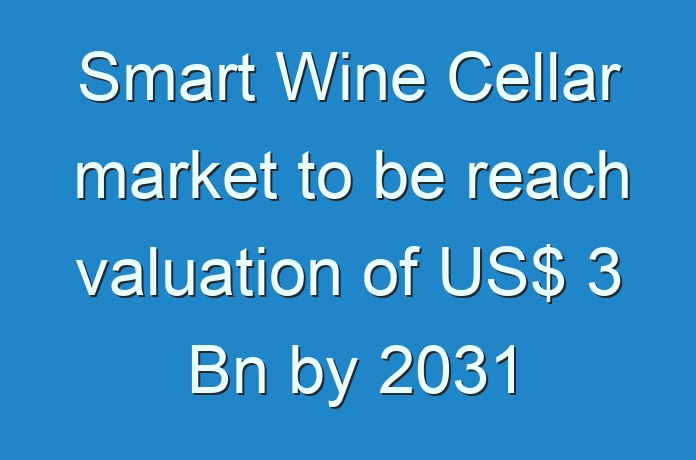
Transparency Market Research delivers key insights on the global smart wine cellar market. In terms of revenue, the global smart wine cellar market is estimated to expand at a CAGR of ~9% during the forecast period, owing to numerous factors regarding which TMR offers thorough insights and forecasts in the global smart wine cellar market report.
In this market report, TMR predicts the growing consumption of a wide range of wine across the globe in residential and commercial spaces would have a noteworthy impact on the overall smart wine cellar market. Rising awareness about maintaining correct conditions for storage of several types of wine, along with the trend of using compact smart appliances in residential kitchens is likely to propel the smart wine cellar market in the Asia Pacific region.
A smart wine cellar is a customized storage room or compact appliance that is developed to store wine bottles at an ideal temperature. It also helps end users to maintain the overall quality and flavor of the wine. Smart wine cellars with multi-functional technology have gained momentum in recent years.
Request a sample to get extensive insights into the Smart Wine Cellar Market
Key manufacturers of smart wine cellars continuously focus on R&D to introduce innovative solutions. The swift development of IoT, cloud computation, artificial intelligence, and other technologies has enhanced relations between humans and equipment. Likewise, consumer consumption patterns have gradually changed, and it has moved toward advanced innovative technology. Regular replacement of traditional products with novel advanced products and sectorial changes have shifted focus from product competition to user value and experience. It has forced manufacturers to focus on R&D to provide innovative products to users. This is likely to drive the smart wine cellar market in the upcoming years.
The rising popularity of smart wine cellars in micro and macro wineries is likely to augment the demand in the near future. The growing wine industry also offers opportunities for the expansion of the smart wine cellar market. In addition, suppliers may also collaborate with contractors and interior designers of smart wine cellars to cater to the requirements of their upcoming projects by offering them customized solutions to enhance their overall revenue.
In terms of capacity, the smart wine cellar market has been divided into up to 500 bottles, up to 1,000 bottles, up to 1,500 bottles, and more than 1,500 bottles. The smart wine cellar market is anticipated to be dominated by the more than 1,500 bottles segment during the forecast period. Based on application, the smart wine cellar market has been bifurcated into residential and commercial. The commercial segment has been classified into restaurant & bar, and hotel & others. In recent years, users prefer smart wine cellars for personal usage in residential premises, which is likely to drive the market.
Stuck in a neck-to-neck competition with other brands? Request a custom report on Smart Wine Cellar Market
In terms of distribution channel, the smart wine cellar market has been categorized into online and offline, wherein offline has been sub-segmented into mega retail stores, specialty stores, and others. Rising preference for compact sized and multi-functional smart solutions by users through eCommerce websites after the COVID-19 lockdowns have also propelled the smart wine cellar market.
Smart Wine Cellar Market: Prominent Regions
Europe led the smart wine cellar market in 2020, and the region is expected to retain its dominance during the forecast period. Rising preference for smart solutions in developed countries such as the U.K, Germany, Italy, and France is influencing end users to opt for smart wine cellars. Apart from Europe, Asia Pacific also significantly contributes to the growth of the global smart wine cellar market. China, Japan, and India are considered major markets for smart wine cellars in Asia Pacific. In addition, relaxation of laws for wine consumption in the Middle East, along with increasing demand for a variety of wines is likely to create demand for smart wine cellars.
Smart Wine Cellar Market: Key Players
The competition landscape of the smart wine cellar market is moderately fragmented with leading players accounting for majority of the revenue share. Key players operating in the global smart wine cellar market include Whirlpool Corporation, Electrolux AB, Haier Inc., Liebherr-International AG, Dometic Group, BSH Home Appliances Corporation, and Middleby Corporation.
Smart Wine Cellar Market: Segmentation
Smart Wine Cellar Market, by Capacity
- Up to 500 Bottles
- Up to 1,000 Bottles
- Up to 1,500 Bottles
- More than 1,500 Bottles
Smart Wine Cellar Market, by Application
- Residential
- Commercial
- Restaurant & Bar
- Hotel & Others
Smart Wine Cellar Market, by Distribution Channel
- Online
- Offline
- Mega Retail Stores
- Specialty Stores
- Others
TMR’s Latest News Publication –





